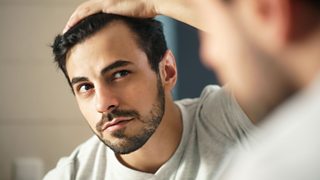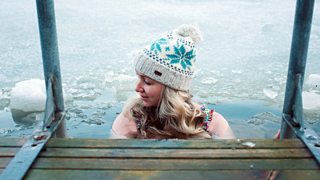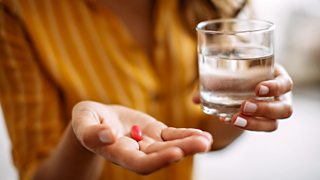Are these essential summer products worth the money?
As we plan for our holidays abroad, and handle the effects of heatwaves at home, we are bombarded with advertising hype about the latest fads promising to fulfil all our summer needs.
But are these products all they're cracked up to be? And with holidays costing us more than ever, are they really worth the money? Does more expensive always mean better?
In ÃÛÑ¿´«Ã½ Radio 4's Sliced Bread, Greg Foot has been doing the research so you don't have to. From sunglasses and sunscreen to mosquito repellents and jet lag products, he uncovers which essentials we should splash our cash on as we dive headlong into summer.
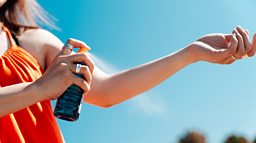
Sunscreen
Which sunscreens offer us the best protection from the summer rays? Dr Andrew Birnie, a dermatologist at East Kent Hospital University NHS Foundation Trust, has been helping Greg decode the labelling.
The SPF or Sun Protection Factor tells you how much longer the sunscreen lets you stay in the sun before you burn. On a sunny day you might last for 20 minutes without sunscreen; an SPF15 sunscreen will allow you to stay out for 15 times that. Does SPF 30 offer double the protection? “The simple answer is yes,” says Andrew.
More expensive brands are not necessarily better. The most important thing is that a sunscreen is “broad spectrum” so it protects against a range of different UV radiation: both UVB (the main cause of skin cancer) and UVA (that penetrates deeper into the skin). The SPF tells you the level of UVB protection, and UVA protection is indicated by the letters ‘UVA’ in a circle and by a star rating system on the bottle. Five stars means that the UVA protection is similar to the UVB protection.
‘Water resistant’ means you’re left with around half of the SPF cover after swimming, and only if you don’t towel dry, explains the dermatologist. After going in the water, immediately reapply. “Don't ever rely on sunscreen staying on.” And always slap on the sunscreen 20 minutes before taking a dip so it has time to soak in.
His top tip? Wearing any sunscreen is better than none. “You want to be reducing your cumulative burden of sun exposure over a lifetime,” says Andrew. “The other really key message for people is not to burn.”
Listen to Greg's full investigation into sunscreen here.
Sunglasses
Do more expensive sunglasses offer better protection for your eyes? And what about a darker tint?
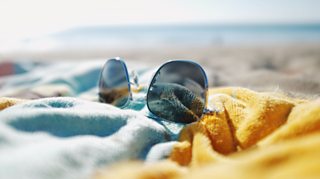
Crucially, you should look for sunglasses marked UV 400. These claim to protect you up to 400 nanometres of harmful UV radiation. “When we buy a pair of sunglasses, ideally what it's going to do is reduce the overall amount of visible light, but also protect us from that UV light,” explains James Wolffsohn, Professor of Optometry at Aston University.
Darker does not mean better. As long as the UV protection is there, the tint really is just a matter of personal preference. (The same goes for polarised lenses. These cut out horizontal reflections, which can be helpful when driving, but don’t affect the UV protection.)
If sunglasses meet the standards that they're meant to then they will carry a CE mark on the frame, or UK CA. However, be aware that some glasses may not deliver on these – buy from a reputable retailer not a market stall.
Finally, paying more might get you glass lenses and increase the durability of your sunnies, but they won't necessarily offer any more protection than middle-of-the-range alternatives. Often, you’re paying over the odds for a designer label; price doesn't dictate compliance with safety standards. “There can be some quite expensive sunglasses that don’t conform, and likewise some relatively inexpensive ones that do,” says James.
Read more about the Greg's investigation into expensive sunglasses here. And listen to the episode in full in on ÃÛÑ¿´«Ã½ Sounds.
Mosquito repellents
Whether staying in your back garden this summer, or travelling somewhere with mosquito-borne diseases like malaria, you’ll be keen to avoid nasty bites. There’s a wide range of repellents claiming to help, but which ones are worth your money?
Professor James Logan from the London School of Hygiene and Tropical Medicine says four active ingredients are scientifically proven to work on mosquitoes. Three of them: DEET, IR3535 and picaridin (aka icaridin) are human-made. The fourth, PMD, is natural – found in the oil of lemon eucalyptus trees. If a mosquito repellent includes one of these, then it should prove effective – as long as it is applied “like a sun cream” to all exposed skin. (Although DEET and PMD are your best bet).
There’s also citronella, which can be better than wearing no repellent at all, says James, but any effect is likely to be short-lived.
Plug-ins – for electrical sockets – are also useful in the fight against mosquitoes. As well as acting as a repellent, these will actually kill the insects. “They work really well,” says James, “but you have to leave them on long enough in a room so that the air fills up with the insecticide.”
To read more about which repellents work best here. To hear all about Greg's nerve-racking mosquito test, listen to the full episode here.
Jet lag products
Jet lag can cause fatigue, disorientation and irritability. There’s an array of products claiming to help weary travellers adjust to new time zones – but which of them really work?
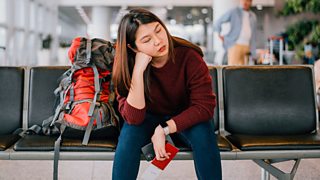
Dr Ben Edwards, from Liverpool John Moores University, explains how jet lag is a “rhythm disturbance” to your body clock, which takes light as its main cue. In 2007, medical journal The Lancet published a on jet lag that recommended the best times to get light at your destination to mitigate its effects. The most important advice is not to try and shift too many hours in one go – if you look at the morning sun at your destination, but your body clock still thinks it’s the middle of the night, it can get confused and think you’re staying up late rather getting up early.
There are a range of supplements suggested. Vitamin C, magnesium, B vitamins and melatonin are included in a jet lag ‘prevention system’ called FlyKitt. But all of the vitamins and minerals can also be obtained from a balanced diet. And “for people who normally sleep well, melatonin doesn't improve their sleep in the new time zone, and it doesn't increase adjustment,” says Ben.
You can also get Iintravenous vitamin drips for before or after your trip for anywhere from £150 to £350. But the main benefit of these is preventing dehydration – easily solved by drinking water – and they can be dangerous. Equally a device called the HumidiFlyer mask that claims to “trap the expired moisture from your breath” to combat dry cabin air might help with fatigue, but won’t prevent jet lag.
Read more about the life hacks claiming to help jet lag here. Listen to the full episode listen on ÃÛÑ¿´«Ã½ Sounds here.
Motion sickness remedies
Travel sickness can really put a dampener on a much longed-for holiday, and make cruises a massive no-go. Professor of Applied Psychology at the School for Social Sciences, Professor John Golding, explains how the dizziness and nausea is caused by a “sensory mismatch” between your inner ears, your eyes and your body.
Trials indicate that acupressure wristbands, which claim to prevent motion sickness, are not much different from a placebo. Although this in itself can be useful, says John. “If someone has tried these wristbands and it has helped them, the advice would probably be to keep using them.”
The common active ingredients in motion sickness pills are cinnarizine and hyoscine hydrobromide (aka scopolamine). “They have similar effectiveness,” says John. “There’ve been some very, very large Royal Navy trials at sea to show that.” Absorption times do vary, so check this before you travel.
There’s also a hyoscine patch that you stick behind your ear. This contains five times the dose, and can last for up to three days, but is a lot more expensive and the onset time could be around eight hours, so apply well in advance. “It's highly effective,” says Andrew, and “the chance of having side effects like drowsiness are less.”
Controlled breathing can help, but by far the most effective – and free – anti-motion sickness method is to train yourself out of it, says the expert. “You have to have many, many exposures to the motion stimulus.” Could be time to book that cruise after all…
Listen to the Motion Sickness Remedies episode in full.
Hay fever treatments
For hay fever sufferers, the arrival of summer can mean a runny nose, congestion and itchy, streaming eyes caused by an immune response to pollen. Antihistamine tablets can help to relieve symptoms – but which ones work best?
The first generation of these tablets includes chlorphenamine, branded as Piriton. This may cause drowsiness. Newer treatments such as cetirizine (hydrochloride), loratadine, fexofenadine and acrivastine are generally less likely to cause sleepiness. Cetirizine is noted to work faster but loratadine’s effects last longer.
Costs vary wildly and it can be worth swerving the big brands. Benadryl Allergy Relief costs 41p per tablet, and the recommended dose is three a day. In contrast, it can be as little as 26p a tablet for Claritin, with Asda’s own brand of loratadine coming in at 7p a tablet!
There is also a plethora of nasal sprays on the market. Clinical director of Allergy UK, Margaret Kelman, says that the steroid-based sprays are particularly effective at relieving congestion whereas the antihistamine sprays are good for itchy, runny noses. Saline sprays help by clearing out allergens.
“All medications are metabolised differently,” says Margaret. “I wouldn't say any one particular antihistamine is better than the other. It just depends on what works for you.”
Read more about the effectiveness of hay fever remedies here. Or you can listen to the full episode on ÃÛÑ¿´«Ã½ Sounds.
The information contained in this article was correct at the time of broadcast on 17 April 2025.
Explore the full Sliced Bread archive, and catch up on Greg's investigations of a range of products from energy drinks to running shoes.
More articles from Sliced Bread
-
![]()
Which pots and pans are best for your kitchen?
What material is best? And is non-stick coating really safe to use?
-
![]()
Do hair loss treatments actually work?
Do lotions and pills designed to help hair loss in men and women really work?
-
![]()
Are ice baths and cold water really good for us?
Is there any truth behind the claims of these purported health benefits of ice baths?
-
![]()
Can anti-ageing products help us to stay young?
Greg Foot investigates the pills that claim to help us to live longer and healthier lives.


